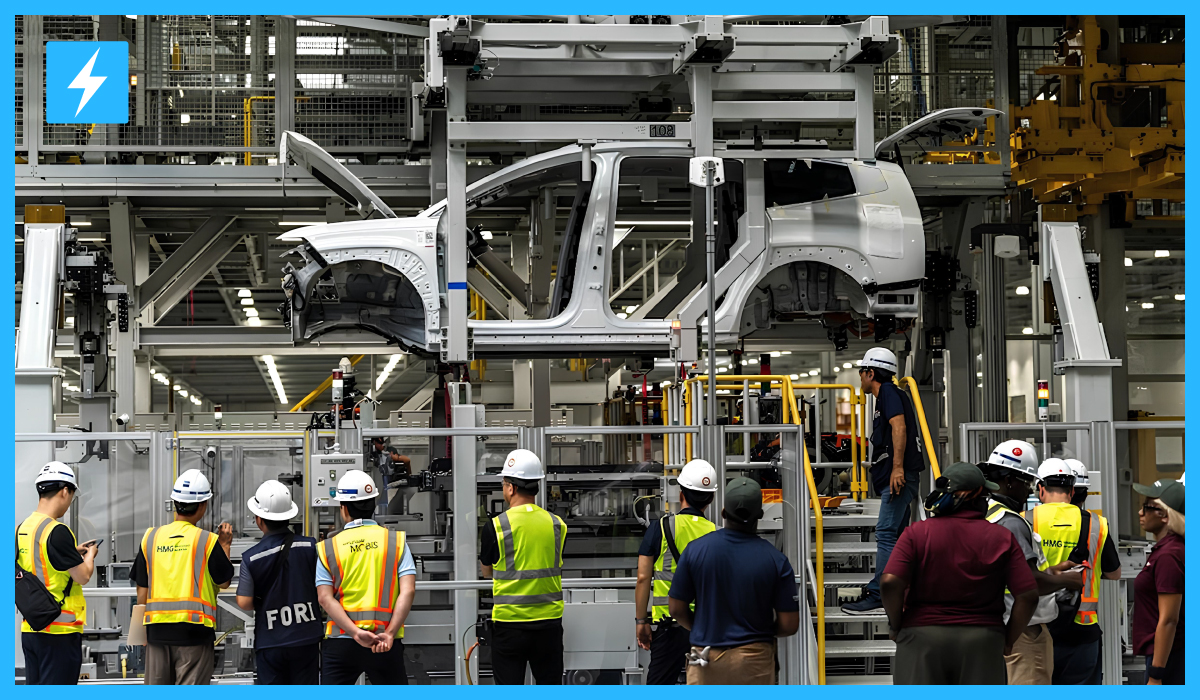Immigration Raid At Hyundai Site In Georgia
Hyundai Georgia Immigration Raid – On Thursday, September 4, 2025, federal law enforcement agents executed a sweeping worksite raid at a Hyundai facility in Bryan County, Georgia, a stunning operation that quickly became a focal point of national debate. The action targeted a vast 3,000-acre electric vehicle (EV) manufacturing site, and by the next day, authorities announced the detention of 475 individuals, most of whom were South Korean nationals.
This operation was hailed by Steven Schrank, a special agent in charge of Homeland Security Investigations (HSI), as the “largest single-site enforcement operation” in the agency’s history, sending a clear message about the Trump administration’s renewed focus on worksite enforcement. The raid not only halted construction on an adjacent battery plant—a critical joint venture with LG Energy Solution—but also highlighted the complex and often conflicting agendas at the intersection of immigration, corporate accountability, and international trade. The event immediately drew intense scrutiny, prompting questions about its political motivations, the legal implications for a major foreign investor, and its potential to exacerbate diplomatic tensions between Washington and Seoul.
The Anatomy of an Unprecedented Operation
The raid at the Hyundai Metaplant was far from a spontaneous or localized event. It was a meticulously planned, multi-month criminal investigation. The operation was a collaborative effort involving hundreds of federal agents from a wide array of agencies, including HSI, U.S. Immigration and Customs Enforcement (ICE), U.S. Border Patrol, the Federal Bureau of Investigation (FBI), the Drug Enforcement Administration (DEA), the Internal Revenue Service (IRS), and the Bureau of Alcohol, Tobacco, Firearms and Explosives (ATF).
These federal units were assisted by local law enforcement, including the Georgia Department of Public Safety and Georgia State Patrol troopers, who blocked roads leading to the site. The extensive list of participating agencies underscores that this was not merely an immigration sweep but a sophisticated, government-wide effort targeting what officials described as “unlawful employment practices and other serious federal crimes”.
Federal agents, many wearing face masks and tactical vests with “HSI” markings, executed a judicial search warrant that gave them the authority to enter private areas of the business. A video posted to social media showed an agent instructing construction workers to “cease immediately” and for all work to “end on the site right now”. While the search successfully shut down construction on the battery plant, operations at Hyundai’s main EV manufacturing facility were not interrupted. This strategic focus on the construction site and the adjacent battery plant, rather than the operational car factory, allowed the government to exert maximum pressure on the new joint venture while minimizing disruption to Hyundai’s ongoing vehicle production.
The government’s characterization of the event as the “largest single-site enforcement operation” in HSI’s history is a notable public relations strategy. While the 475 arrests mark a significant number for a single location, the total is fewer than other major worksite enforcement actions during the Trump administration’s first term, such as the coordinated raids on multiple Mississippi poultry plants in 2019, which led to approximately 680 arrests.
By focusing on a single, high-profile target—a major foreign investor in a crucial U.S. state—the administration amplifies the symbolic power of the action. This framing sends a more potent message than a raid on smaller, multi-site businesses, demonstrating that no corporation, regardless of its size or international prominence, is beyond the reach of federal immigration enforcement. The strategic choice of target and the carefully chosen language highlight a deliberate shift in enforcement priorities, moving from smaller, easier-to-execute arrests to high-impact, headline-grabbing operations that serve a clear political purpose.
| Key Facts of the Georgia Hyundai Raid | |
| Date | Thursday, September 4, 2025 |
| Location | Hyundai Metaplant, Bryan County, Georgia |
| Target | Battery Plant Construction Site (Joint venture with LG Energy Solution) |
| Number of Detainees | 475 |
| Primary Agency | Homeland Security Investigations (HSI) |
| Assisting Agencies | ICE, Border Patrol, FBI, DEA, IRS, ATF, Georgia State Patrol |
| Investigation Type | Criminal, multi-month |
| Key Outcome | Construction halted on the battery plant |
Export to Sheets
Official Rationale and The Broader Enforcement Push
In the aftermath of the raid, federal officials were quick to articulate the government’s justification for the action. In a statement, Steven Schrank asserted that the operation underscored a “commitment to protecting jobs for Georgians and Americans, ensuring a level playing field for businesses that comply with the law, safeguarding the integrity of our economy and protecting workers from exploitation”. He also stated that the operation “sends a clear message that those who exploit the system and undermine our workforce will be held accountable”. The government’s narrative presents the raid as a necessary measure to enforce federal law and protect both domestic workers and legal businesses.
This operation represents a dramatic return to a policy framework that had been largely dismantled under the previous administration. In 2021, the Biden administration announced an end to the use of large-scale workplace raids as an immigration enforcement tool, a policy decision that the second Trump administration has openly reversed. The shift is supported by significant federal investment, including the “One Big Beautiful Bill Act,” which allocates $165 billion to the Department of Homeland Security (DHS), in part to hire thousands of new customs and border officers. The Hyundai raid is one of a series of recent large-scale operations across the country, targeting various industries from construction to meatpacking.
The government’s emphasis that this was a “multi-month criminal investigation” with a judicial warrant is a crucial component of its official rationale. This is a deliberate distinction from what officials call an “immigration operation where agents went into the premises, rounded up folks, and put them on buses”. The judicial search warrant signifies that a judge found probable cause to believe that a crime—not just an immigration violation—had been committed.
This legal framing positions the raid as a formal, targeted strike against serious criminal wrongdoing, rather than a politically motivated show of force. The presence of a judicial warrant also provides a stronger legal foundation for the government’s actions, making them more difficult to challenge on grounds of arbitrary or discriminatory enforcement. Despite this, the timing of the raid and its high-profile target still suggest a political motive. The administration is balancing its legal obligations with its political promise to enforce immigration laws more aggressively, creating a complex interplay between a formal legal process and a broader political agenda.
Corporate Shielding: The Subcontractor Defense and a Troubling History
In its immediate public response, Hyundai Motor Company sought to distance itself from the raid and the detained workers. A spokesperson for the company issued a statement asserting that “none of those detained is directly employed by Hyundai Motor Company”. The company emphasized its commitment to “full compliance with all laws and regulations” and stated that it expects “the same commitment from all our partners, suppliers, contractors, and subcontractors”. This common corporate defense, placing the burden of employment verification on third-party contractors, suggests that the responsibility for the alleged “unlawful employment practices” rests with the companies that directly hired the workers.
However, this is not the first time Hyundai has faced scrutiny over its labor practices within its U.S. supply chain. The Georgia raid occurs just three years after a major scandal involving the illegal employment of child labor at a Hyundai auto-parts subsidiary in Alabama. In 2022, a Reuters investigation found that several Hyundai and Kia suppliers in Alabama were using child labor, with some minors as young as 13 working long hours on assembly lines.
The U.S. Department of Labor (DOL) filed a complaint alleging that Hyundai and its subsidiary, SMART Alabama LLC, were a “single employer” and therefore jointly liable for the violations. The complaint explicitly challenged the corporate defense of outsourcing liability, stating that “companies cannot escape liability by blaming suppliers or staffing companies for child labor violations when they are in fact also employers themselves”.
The existence of this prior case provides crucial context for the Georgia raid. It suggests that the use of subcontractors may be part of a larger, systemic pattern within Hyundai’s U.S. operations where the company creates distance between itself and the hiring practices of its partners, even when those practices are alleged to be illegal. The allegations of “unlawful employment practices” in Georgia mirror the themes of labor violations and supply chain responsibility seen in the Alabama case.
This history makes Hyundai’s defense that it had no direct knowledge of the workers’ status less credible in the eyes of many, turning the Georgia raid from an isolated incident into a chapter in a continuing narrative about corporate accountability in a complex global supply chain. The raid therefore highlights a significant legal and ethical challenge for multinational corporations that rely on a network of contractors to staff their U.S. operations.
The Diplomatic and Economic Aftermath
The raid has far-reaching implications beyond the factory gates, particularly on the diplomatic front. The South Korean government swiftly responded, expressing “concern and regret” over the operation that detained its citizens. South Korean Foreign Ministry spokesperson Lee Jaewoong issued a formal statement warning that the “economic activities of our companies investing in the U.S. and the rights and interests of our nationals must not be unjustly violated”. The ministry dispatched diplomats from its embassy in Washington and its consulate in Atlanta to the site to form an on-site response team.
This diplomatic friction exposes a fundamental policy paradox at the heart of the current administration’s agenda. On one hand, the U.S. has actively courted foreign direct investment, with the Hyundai plant itself being a testament to that effort. The Georgia facility was celebrated by Governor Brian Kemp and other state officials as “the largest economic development project in the state’s history”.
South Korean companies have pledged billions of dollars in U.S. investments, including $26 billion from Hyundai Motor Group, to secure market access and navigate potential tariffs. The raid, however, directly undermines this economic diplomacy by creating an environment of uncertainty and risk for foreign investors. The immediate consequence—the halt of construction on the battery plant—is a tangible disruption to a multi-billion dollar project.
The raid has created a chilling effect that could deter future foreign investment. Businesses now face a new variable in their risk calculations: the potential for a disruptive federal enforcement action that could shut down operations, damage their reputation, and create legal headaches, regardless of their direct employment practices. The operation therefore puts the Trump administration’s twin goals of boosting domestic manufacturing and implementing a hardline immigration agenda into direct conflict. By enforcing its immigration policies in a manner that disrupts key economic partnerships, the administration risks alienating allies and jeopardizing the very investments it has worked to attract.
A Nation Divided: Public and Political Reactions
The raid at the Hyundai facility has not only caused a diplomatic stir but has also deeply polarized public and political opinion within the United States. This division is evident in the stark contrast between official statements and reactions across social media. On one side, proponents of the administration’s hardline immigration policies praised the operation. U.S. Representative Buddy Carter, for example, applauded the action as a “bold” step to “put American workers first” and protect communities from “the scourge of illegal immigration”. This viewpoint frames the raid as a necessary and justified measure to uphold the rule of law and protect domestic jobs.
Conversely, opponents condemned the action as politically motivated and harmful. Charlie Bailey, chair of the Democratic Party of Georgia, described the raid as a “politically-motivated fear tactic” designed to “terrorize people who work hard for a living, power our economy, and contribute to the communities across Georgia”. Yvonne Brooks, president of Georgia’s AFL-CIO chapter, echoed this sentiment, calling the raid “the latest in an ongoing campaign of harassment” that creates an “atmosphere of fear” for immigrant workers.
The public debate on social media platforms like X (formerly Twitter), Facebook, and Reddit reveals a similar schism and a wide range of speculative theories. An X.com post from ATF Atlanta, one of the participating agencies, highlighted the apprehension of “~450 unlawful aliens,” framing the operation as a win for community safety. Meanwhile, public comments on platforms like Reddit showed deep concern and speculation. Some users expressed fear that the raid would discourage future foreign investment in Georgia and the U.S. at large. Others theorized that a disgruntled, unqualified individual might have “reported the place” out of jealousy, leading to the federal action.
A separate thread discussed the possibility that the raid was orchestrated by “American car makers” to “derail Hyundai and other foreign car makers,” suggesting that the event was a protectionist move against foreign competition. These varied and often contradictory reactions demonstrate that the event is not perceived through a single lens; rather, it is viewed as a complex issue of national security, corporate greed, economic nationalism, or human rights, highlighting the deep ideological fault lines in American society.
Conclusion
The raid on the Hyundai factory in Georgia stands as a powerful symbol of the complex and often contradictory forces at play in contemporary U.S. policy. It is a story that goes beyond a simple immigration enforcement action, revealing a nexus of corporate liability, international diplomacy, and domestic political strategy. The operation highlights the administration’s renewed commitment to large-scale worksite enforcement, a dramatic shift from previous policy, and signals that no corporation is immune from scrutiny. At the same time, it exposes a troubling pattern within Hyundai’s U.S. supply chain, building upon the child labor allegations in Alabama to challenge the company’s “subcontractor defense” and raise questions about systemic labor issues.
On the geopolitical stage, the raid has created a direct conflict between the administration’s desire to attract foreign investment and its hardline immigration agenda. The action not only drew sharp condemnation from a key ally, South Korea, but also created an environment of uncertainty that could have a lasting chilling effect on future foreign direct investment. This serves as a stark reminder of the potential for domestic policies to have significant international consequences, disrupting carefully negotiated economic partnerships.
Ultimately, the events at the Hyundai factory underscore the profound policy paradox at the heart of the administration’s agenda. The conflicting goals of attracting global capital while aggressively enforcing immigration laws in a manner that alienates foreign partners and disrupts economic projects cannot be reconciled without significant friction. The fallout from this single event may have long-term implications for U.S.-South Korean relations and the future of foreign investment in a country where political and economic goals are increasingly at odds.
Frequently Asked Questions (FAQs)
Q: Why was the Hyundai factory in Georgia raided by immigration authorities? A: The raid was not a typical immigration sweep but part of a formal “multi-month criminal investigation” conducted by federal agents from Homeland Security Investigations (HSI) and other agencies. It was based on a judicial search warrant that alleged “unlawful employment practices and other serious federal crimes” at the construction site for a new battery plant.
Q: How many people were detained in the operation? A: Federal authorities announced that 475 people were detained during the raid. According to HSI Special Agent Steven Schrank, the majority of the detainees were South Korean nationals.
Q: Were the detained workers employed directly by Hyundai? A: A Hyundai spokesperson stated that none of the individuals detained were directly employed by the automaker. The company clarified that the workers were employed by contractors and subcontractors at the construction site. Hyundai asserted that it requires all of its partners to comply with U.S. laws and regulations.
Q: What is the legal basis for a raid of this nature? A: The raid was conducted under the authority of a judicial search warrant, which requires a judge’s signature and indicates a formal criminal investigation. This is a more substantial legal basis than an administrative warrant and distinguishes the operation from a less-formal immigration enforcement action.
Q: How did the South Korean government react to the raid? A: The South Korean government expressed “concern and regret” over the operation targeting its citizens. A spokesperson for the Foreign Ministry warned that the “economic activities of our companies investing in the U.S. and the rights and interests of our nationals must not be unfairly violated” during U.S. law enforcement operations. South Korea also dispatched diplomats to the site to assist its citizens.
Q: What are the broader implications of this raid for U.S. business and foreign investment? A: The raid may create a “chilling effect” on foreign investment in the U.S. by demonstrating that even major multinational corporations are vulnerable to disruptive enforcement actions. It highlights a potential conflict between the administration’s goals of attracting foreign capital and its aggressive immigration policies. The raid also brings attention to a previous case where a Hyundai subsidiary was accused of using child labor in Alabama, suggesting a potential systemic issue with labor practices within the company’s supply chain.
The article was composed using information from a variety of sources, including reports from major news agencies and publications. These sources include articles from cbsnews
,(https://www.theguardian.com/us-news/2025/sep/05/immigration-ice-raid-hyundai-georgia)), the Associated Press
, AJC and Livemint Additional details and context were drawn from legal analysis and official government documents, such as a dol.gov a report on kslaw.com and a guide for employers from AILA
. Insights into the public reaction were gathered from reddit.com and analysis from the American Immigration Council
. Historical context on the Alabama child labor allegations was sourced from business-humanrights.org and repairerdrivennews.com
Finally, several video news reports from(https://www.youtube.com/watch?v=zZIvpYo2g7c) were utilized for on-the-ground footage and additional commentary.




